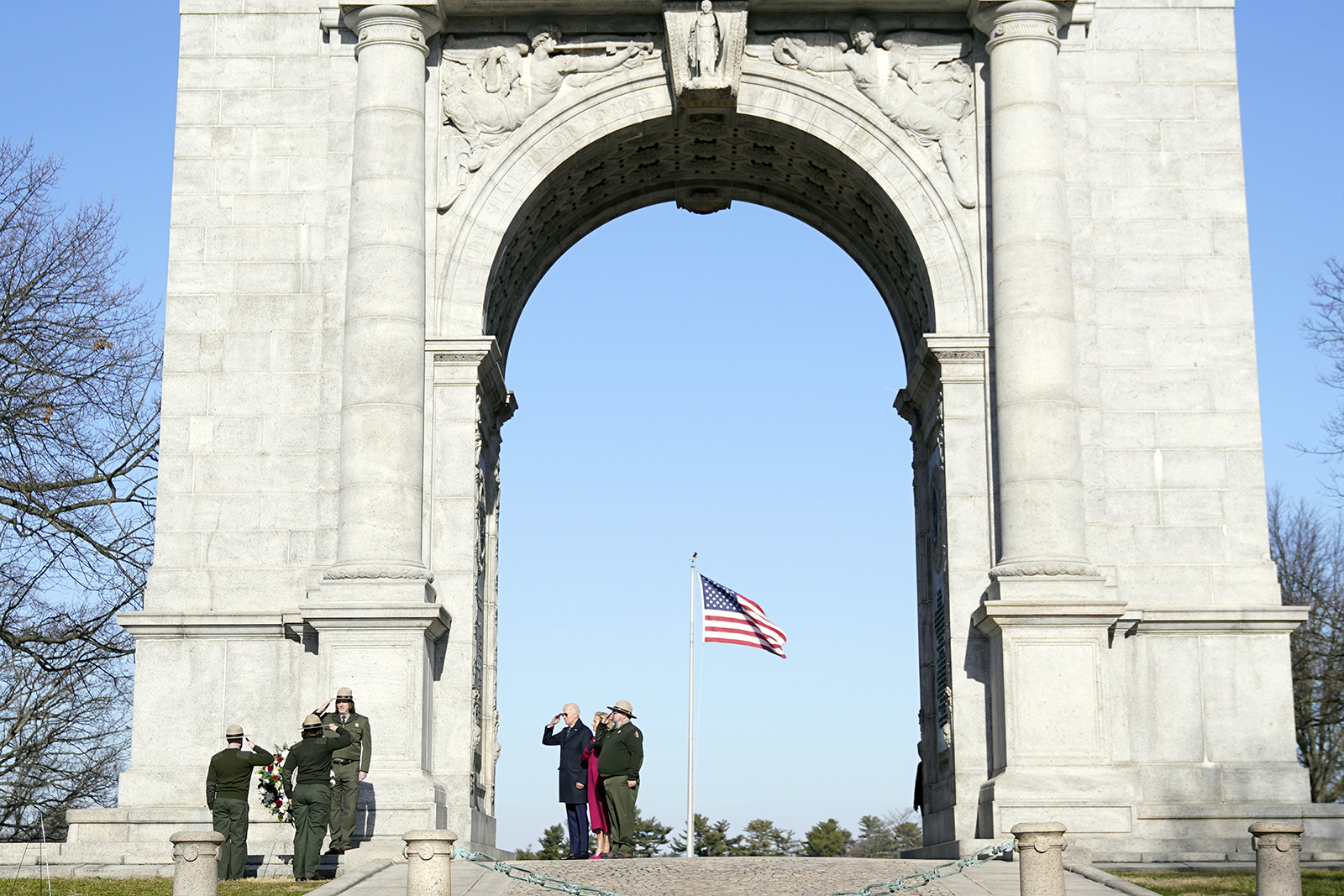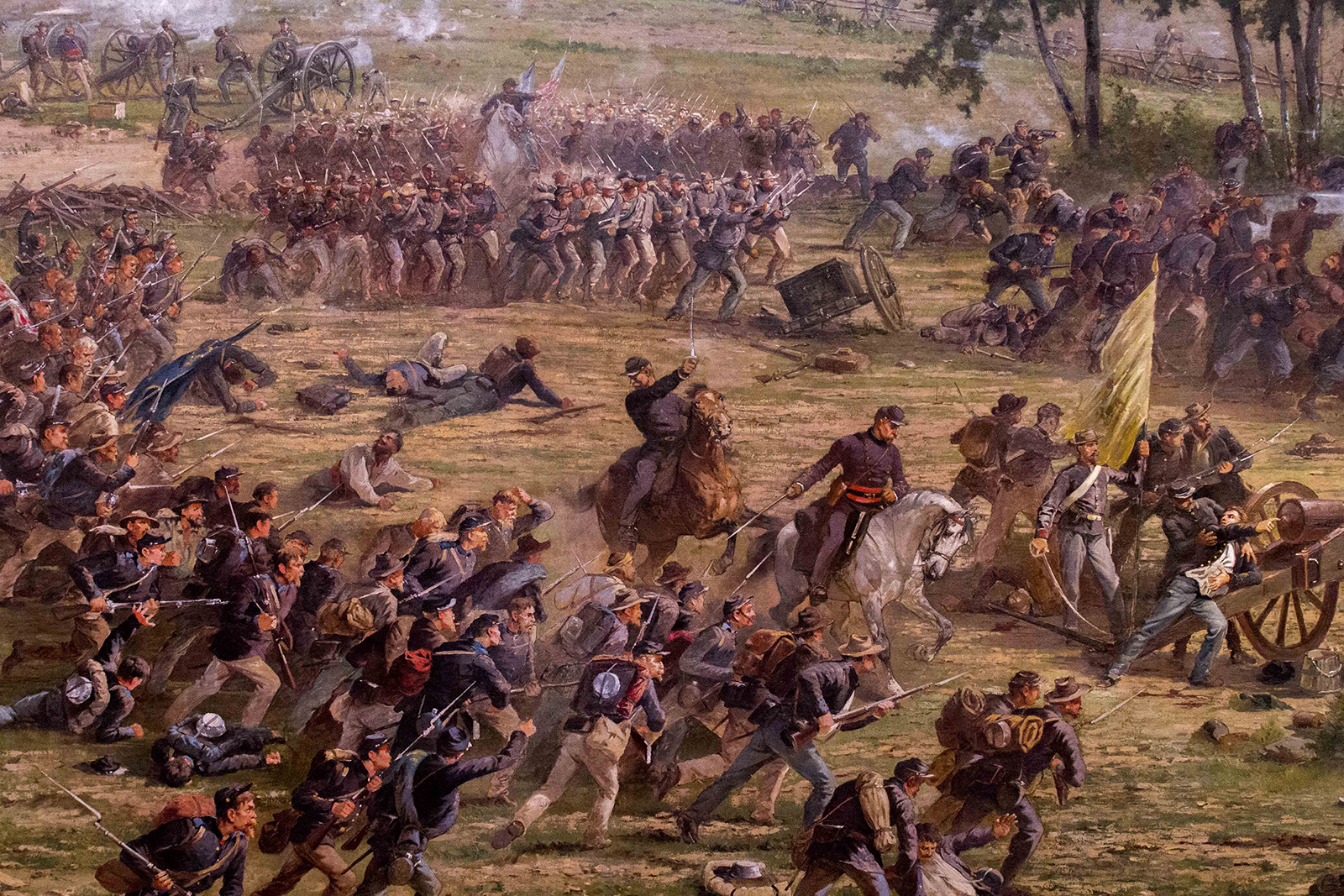
President Joe Biden and first lady Jill Biden participate in a memorial wreath ceremony at the National Memorial Arch at Valley Forge National Historic Park in Valley Forge, Pa., Jan. 5, 2024. (AP Photo/Stephanie Scarbrough)
(RNS) — It wasn’t a bad idea for President Joe Biden to go to Valley Forge to kick off his reelection campaign Friday (Jan. 5).
On the eve of the third anniversary of the MAGA invasion of the U.S. Capitol, Biden sought to draw the starkest of contrasts between Donald Trump’s “assault” on democracy and his own defense of it. “Whether democracy is still America’s sacred cause is the most urgent question of our time,” Biden said.
Even if George Washington didn’t actually call democracy a sacred cause at Valley Forge, as Biden claimed, the United States is unlikely to have achieved independence as a democratic republic had the future first president not retrained and reorganized his ragtag army there in the winter and spring of 1778. Valley Forge is thus a sacred site in what has come to be known as the American civil religion.
To be sure, it wasn’t beside the point of Biden’s campaign kickoff that Pennsylvania is one of those swing states that will determine the outcome of the election in November.
Still, 100 miles west of Valley Forge, also in Pennsylvania, there’s another, even more sacred site where Jan. 6 resonates more loudly. The Gettysburg National Military Park commemorates not only the Union Army’s critical victory over the Southern rebellion, but the most famous endorsement of the American experiment ever given by a president, Abraham Lincoln’s Gettysburg Address.
Speaking four months after the battle at the dedication of the Gettysburg military cemetery on Nov. 19, 1863, Lincoln declared that the soldiers who died had “consecrated” the battlefield so that “this nation, under God, shall have a new birth of freedom, and that government of the people, by the people, for the people, shall not perish from the earth.”
Talk about democracy as a sacred cause!

Gen. Alexander Webb (on white horse) leads the Union attack during the Battle of Gettysburg. Part of the the Battle of Gettysburg Cyclorama painting by artist Paul Philippoteaux, at Gettysburg National Military Park. (Photo by National Park Service/Creative Commons)
Lincoln also emphasized that it was “for us the living” to be “dedicated here to the unfinished work which they who fought here have thus far so nobly advanced.” Whatever the larger implications of this statement, with the 1864 presidential election less than a year away it was also a campaign pitch — a plea by the Republican president to continue the war in the face of Democratic calls for an immediate cessation of hostilities and Lincoln’s own concern that he would not be reelected.
In the event, of course, Lincoln won the election handily, though then as now Pennsylvania was a swing state and he carried it by just 3.5 percentage points.
Given all the parallels, I imagine there were those in the White House who urged Biden to give his speech in Gettysburg — to associate himself and his cause with Lincoln rather than Washington. In fact, he did give a nod to the Civil War when he spoke of “the mob that attacked the Capitol, waving Trump flags and Confederate flags.”
But he didn’t go to Gettysburg, and it’s not hard to understand why.
For starters, no president should risk putting his words up against Lincoln’s immortal prose.
More importantly, equating the Jan. 6 (or, more accurately, the post-2020-election) insurrection to the Civil War is a double-edged sword. On the one hand, it brands the insurrection and its protagonist as anti-American. On the other, its vastly smaller scale invites critics to downplay its significance. Plus, with voters to attract in Virginia, North Carolina, Georgia, and Florida, does Biden really want to be seen as refighting the War Between the States?
Finally, there’s the issue of Section 3 of the 14th Amendment barring insurrectionists who have taken an oath to support the Constitution from again holding office — passed after the Civil War to keep out of government former public officials who supported the Confederacy. If Biden thinks it applies to his predecessor, he’s avoided directly saying so.
After the Colorado Supreme Court found Trump ineligible for office under Section 3 last month, Biden told a reporter there was “no question” that he was responsible for supporting an insurrection. “It’s self-evident,” he continued. “You saw it all. Now, whether the 14th Amendment applies, I’ll let the court make that decision.”
Perhaps not coincidently, the U.S. Supreme Court announced its review of the Colorado case on the eve of Jan. 6, when Biden was giving his campaign speech at Valley Forge. If he’d given it at Gettysburg, he’d have seemed to be putting his thumb more forcibly on the scale.





